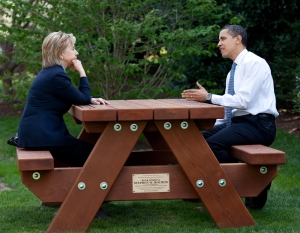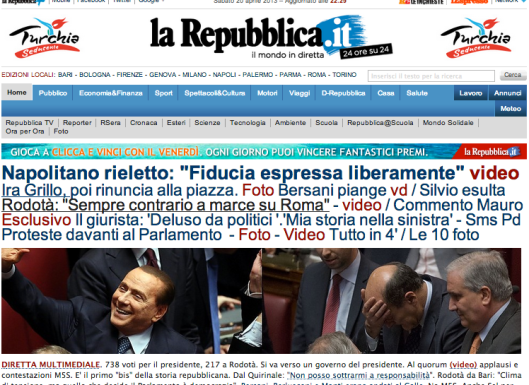Tags
Barack Obama, Beppe Grillo, Gianlorenzo Bernini, Giorgio Napolitano, Hillary Clinton, Italy, jorge mario bergoglio, la repubblica, Pier Luigi Bersani, politics, Politics of Italy, President of Italy, Rome, Silvio Berlusconi, United States
Bernini would probably shrug and say, “Eh? Che ci voi fare?”
Just before I arrived in Italy earlier this month, the country held an election that ended in chaos. From what I understand (and it’s no simple task to comprehend the machinations of Italian politics), no candidate or party received enough votes to win the majority, and so Italy hasn’t had a functional government for two months. (Yes, it took only two days to elect Jorge Mario Bergoglio as the new pope, but a new head of state is another matter.)

Beppe Grillo on the tribune of the Five Star Movement at Piazza Dante in Trento during the collection of signatures for the presentation of the lists for the political elections in 2013. (Photo by Niccolò Caranti)
I’m not going to pretend to be any kind of expert on this, so please forgive any errors, but here’s my attempt to figure out what the heck is going on.
An “Occupy Wall Street”–like anti-establishment group, the Five Star Movement, headed by comedian/actor Beppe Grillo, won a quarter of the votes in the election, and super-sleazemeister Silvio Berlusconi, incredibly, is still oozing and schmoozing around with his center-right coalition (called the People of Freedom…seriously).
This week, 1,007 electors in Parliament voted to pick a president, which apparently, in Italy, is kind of a ceremonial position. The real power of the government rests with the prime minister (most recently Pier Luigi Bersani, who resigned, so as of now there is none). The governmental process here is going just about as smoothly as the recent U.S. Senate non-vote on stricter background checks for gun buyers.
Today, on April 20, the vote stumbled through its third day; a number of candidates had withdrawn; some lawmakers had declined to vote or said they’d cast empty ballots in protest; and more than 100 lawmakers from the center-left refused to recognize their own candidate. The newspapers here said the country is “suspended in a void.” Ma aspetti! (But wait!) As I’m writing this, (almost 88-year-old) Italian president Giorgio Napolitano agreed to run again: Once more unto the breach! And he got elected. But what does that mean? (He was named a Life Senator in 2005, so, maybe now he’s a Life President.) Um….
During all of this, I’ve had several charged political conversations (or attempts at conversation, in Italiano) with my language teacher, Eva, at I Love IT school in Orvieto. She tried to give me some insight into Italian politics through the years after she pulled out magazine pictures of Berlusconi and Barack Obama for us to discuss as a speaking exercise.

President Barack Obama and Secretary of State Hillary Rodham Clinton speak together sitting at a picnic table April 9, 2009, on the South Lawn of the White House. Official White House Photo by Pete Souza
I stated that while it’s great that America elected an African-American president, I hoped that Hillary Clinton would decide to run in 2016. I told Eva I wasn’t surprised that we, in America, elected a black man before we elected a woman president—after all, black men got the vote in 1869, long before women—of any color—did in 1920. And I sincerely hope it won’t be 50 years before we elect a woman president.
Eva pointed out that Italian women couldn’t vote until 1946, when the end of World War II prompted the decision by the interim government (after the fall of Mussolini and Fascism) to hold a nationwide vote (introducing universal suffrage for the first time). 
Italian provinces were united in 31 constituencies, each electing a group of candidates. Along with the election, voters were asked to decide if they wanted the country to become a true republic, or if they favored the return of a monarchy and Umberto II of Savoy, the last king of Italy.
Northern Italy voted for a republic. Southern Italy voted for a monarchy. According to Eva, the Republic won the referendum because votes from Sicily (aka the home of the Mafia), which would have tipped the decision over to the monarchists, mysteriously didn’t make it to Rome in time to be counted. (Hanging chads, anyone?)
At any rate, Italy became a democracy with elections held, er…every so often. Technically, members of parliament serve a maximum of five years. But a president (or maybe a prime minister?) can dissolve parliament and hold new elections if he chooses. Capisci? I don’t!
But ever since the February election ended essentially in a draw, the lawmakers have been haggling over whom to elect as president. Now that Napolitano has stepped up, who will be prime minister? And who’s really calling the shots? Uh….
Of course, things weren’t any better in Gian Lorenzo Bernini’s day, when the Popes ruled like royalty and the church’s power kept the people dependent on them, even for loaves daily bread. Voting by the people? Fuhgeddaboudit!
So, what did I discover during my search to understand Italian politics? In a week during which I read numerous articles and Facebook posts about the mess in Washington, D.C.—about how the U.S. Congress remains clutched in the grip of the NRA and won’t choose the sane path regarding stricter gun control (and that’s only the latest in a painfully long list of non-action and partisan rifts)—I learned, as someone who is trying on a new country for size, that there is a place like home. Governmental dysfunction seems to be universal.
As Tony Soprano—or Bernini—might have said, “Che ci voi fare?” (What are you gonna do?) Ciao!








Molto divertente il tuo punto di vista sulla democrazia in Italia ed anche molto realistico (purtroppo!) In fin dei conti se avesse vinto la monarchia potremmo essere come la Spagna… Mi sa tanto che la storia di un popolo è indipendente dai suoi governanti…che ce voi fà!
LikeLike
Grazie Elena! Sono sicuro che ci sono alcuni errori, ma sto provando per capire la politica qui. Piano, piano!
LikeLike